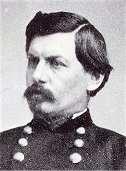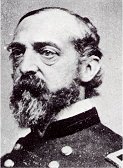
In The Eyes Of
His Contemporaries





 |
||||||||||||||||||||||||||||||||||||||||||||||||||||||||||||||||
| General Hancock In The Eyes Of His Contemporaries |
||||||||||||||||||||||||||||||||||||||||||||||||||||||||||||||||
| His Commanding Officers | ||||||||||||||||||||||||||||||||||||||||||||||||||||||||||||||||
| "Hancock was superb today." | ||||||||||||||||||||||||||||||||||||||||||||||||||||||||||||||||
 |
||||||||||||||||||||||||||||||||||||||||||||||||||||||||||||||||
| "He was a man of most chivalrous courage and of a superb presence, especially in action; he had a wonderfully quick and correct eye for ground, and for handling troops; his judgement was good, and it would be difficult to find a better corps commander." | ||||||||||||||||||||||||||||||||||||||||||||||||||||||||||||||||
| "He was brilliant in the extreme." | ||||||||||||||||||||||||||||||||||||||||||||||||||||||||||||||||
| "Hancock conducted himself magnificently; his charge was elegant!" | ||||||||||||||||||||||||||||||||||||||||||||||||||||||||||||||||
 |
||||||||||||||||||||||||||||||||||||||||||||||||||||||||||||||||
| "Bully Hancock is the only one of my corps commanders who will always go right in when I order him." | ||||||||||||||||||||||||||||||||||||||||||||||||||||||||||||||||
| "No commanding General ever had a better lieutenant than Hancock, he was always faithful and reliable." | ||||||||||||||||||||||||||||||||||||||||||||||||||||||||||||||||
| "Hancock stands the most conspicuous figure of all the general officers who did not exercise a separate command. He commanded a corps longer than any other one, and his name was never mentioned as having committed in battle a blunder for which he was responsible. He was a man of very conspicuous personal appearance. Tall, well-formed and, at the time of which I now write, young and fresh-looking, he presented an appearance which would have attracted the attention of an army as he passed. His genial disposition made him friends, and his personal courage and his presence with his command in the thickest of the fight won for him the confidence of troops serving under him. No matter how hard the fight, the 2d Corps always felt that their commander was looking after them." | ||||||||||||||||||||||||||||||||||||||||||||||||||||||||||||||||
 |
||||||||||||||||||||||||||||||||||||||||||||||||||||||||||||||||
| "Hancock is a glorious soldier!" | ||||||||||||||||||||||||||||||||||||||||||||||||||||||||||||||||
| "There is a soul to an army as well as to the individual man, and no general can accomplish the full work of his army unless he commands the soul of his men as well as the body and legs. Hancock possessed this mystic appeal as did few others." | ||||||||||||||||||||||||||||||||||||||||||||||||||||||||||||||||
 |
||||||||||||||||||||||||||||||||||||||||||||||||||||||||||||||||
| "The impersonation of the defense." | ||||||||||||||||||||||||||||||||||||||||||||||||||||||||||||||||
| "No matter what his opinions -- and they were always strong -- he was knightly loyal to his superior officers." | ||||||||||||||||||||||||||||||||||||||||||||||||||||||||||||||||
| "One of the greatest soldiers in history." | ||||||||||||||||||||||||||||||||||||||||||||||||||||||||||||||||
| "Hancock was a soldier, a man -- a very splendid man." | ||||||||||||||||||||||||||||||||||||||||||||||||||||||||||||||||
 |
||||||||||||||||||||||||||||||||||||||||||||||||||||||||||||||||
| "He was the most loyal subordinate I ever knew. He always tried to carry out his orders in their spirit as well as to the letter, and whatever he might think of them, when he received them they became his own and a part and parcel of himself." | ||||||||||||||||||||||||||||||||||||||||||||||||||||||||||||||||
| HOME | ||||||||||||||||||||||||||||||||||||||||||||||||||||||||||||||||